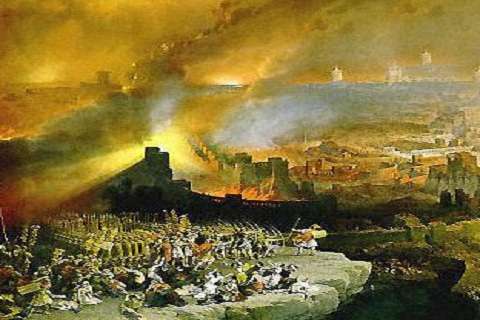This post is the sequel to Did Josephus Fabricate the Origins of the Jewish Rebellion Against Rome? It is my take on Professor James S. McLaren’s chapter, “Constructing Judaean History in the Diaspora: Josephus’s Accounts of Judas” in Negotiating Diaspora: Jewish Strategies in the Roman Empire.
In the previous post we covered McLaren’s analysis of the contexts, style and contents of the respective references to Judas the Galilean in both Wars (written shortly after the fall of Jerusalem in 70 CE) and Antiquities (completed some twenty years later).
McLaren’s next step is to assess the situation (both geographical and socio-political) of the author of these references.
When the war broke out Josephus was in Jerusalem. He was in a position to have a fair idea of what was going on. The war itself was initiated by the priests of Jerusalem refusing to sacrifice to the Roman emperor.
25. The view that it was Jerusalem-based aristocratic priests who were instrumental in starting and leading the revolt concurs with the general picture of ‘native’ revolts in the Roman Empire (Dyson 1975 = “Native Revolt Patterns in the Roman Empire”, ANRW II.3: 138-175). The silver coinage issued in the first year of the revolt helps confirm the crucial role of priests in instigating and leading the revolt. See McLaren 2003 = “The Coinage of the First Year as a Point of Reference for the Jewish Revolt (66-70 CE)”, Scripta Classica Israelica 23:135-52.
It was the priests who were among the prime movers at the start of the war when they ceased offering sacrifices on behalf of Rome and the emperor, not nameless revolutionaries or insurgents. Josephus should be placed among these priests who publicly rejected Roman rule in 66 CE. He, therefore, went to Galilee, the likely direction from which the Romans would attack, as an active rebel leader commissioned by those in Jerusalem who had decided to defy Rome.25 (101)
McLaren insists that Josephus himself was one of the rebels who initiated the break with Rome. In 66 CE he was not a moderate trying to soothe ruffled feathers or a reluctant participant.
For McLaren,
26. Obviously there are pitfalls with any interpretation that incorporates an argument from silence. However, given that the only eyewitness account is trying to suppress what actually happened, the absence of direct evidence is no surprise. If anything, what could be seen as most puzzling is why there is any reference to the war cry at all; surely no mention at all would be better. Clearly that would be one way of dealing with the problem, unless others were still alive who could counter the oversight with their own version, especially as Josephus had no guarantee that his would be the only account written. Another approach would be to find a scapegoat, as suggested here.
The key contention is that Josephus and his fellow rebel priests advocated rebellion against Roman authority, using as a rallying-point the claim of ‘God alone as master’. No direct evidence for this view remains in the War account of 66. It has been deliberately edited out of 66 CE and the war cry has been relocated to another time, group and place, namely, Judas from Galilee and the supposed fourth philosophy.26 (102)
McLaren argues that the conflict sprang up quickly. It was not apparently an eventual eruption that had been building up through pressures for decades prior. Human folly of the moment was more likely the culprit.
In the wake of the recent census in 65/66 (War 6:422-23) and the subsequent dispute regarding the outstanding tribute (War 2:293-96, 404-407) some of the Jerusalem priests decided to take drastic action. (102-103)
That coins were minted to mark the beginning of the revolt and the decision to stop sacrifices for Rome are strong indications that the Temple establishment was a principal actor. The symbols and inscriptions on the coins and Josephus’s discussions elsewhere (especially in Apion) point to the priests leading the revolt under with the ideological belief in the rightness of God’s rulership through his priests. Josephus, after the war as a de facto captive in Rome, transferred the slogan to a group as far from himself and his associates as possible. Josephus needed to justify the mercy shown to him in allowing him to live and prosper anew in the city of his nation’s destroyers so his the former ideological rallying cry of “no master but God” had to be sloughed off and planted on others.
Judas the Scapegoat
Continue reading “Josephus Scapegoats Judas the Galilean for the War?”
Like this:
Like Loading...
 Jewish zeal for both liberty from foreign rule and a passion to be ruled “by God alone” are generally thought to be the causes of Judaea’s war with Rome that ended with the destruction of Jerusalem and its Temple in 70 CE. Hence, goes the common view, the many Jews who were influenced by this politico-religious liberation movement loathed not only the Roman rulers but also the corrupt priesthood whom they considered to be in league with their foreign oppressors. Add a pinch of messianic hopes to this mix and we have a powder-keg situation with the mass of restive Judaeans set against the Romans. It was only a matter of time before it all blew up in all-out rebellion and war, as it did in 66 CE.
Jewish zeal for both liberty from foreign rule and a passion to be ruled “by God alone” are generally thought to be the causes of Judaea’s war with Rome that ended with the destruction of Jerusalem and its Temple in 70 CE. Hence, goes the common view, the many Jews who were influenced by this politico-religious liberation movement loathed not only the Roman rulers but also the corrupt priesthood whom they considered to be in league with their foreign oppressors. Add a pinch of messianic hopes to this mix and we have a powder-keg situation with the mass of restive Judaeans set against the Romans. It was only a matter of time before it all blew up in all-out rebellion and war, as it did in 66 CE.
